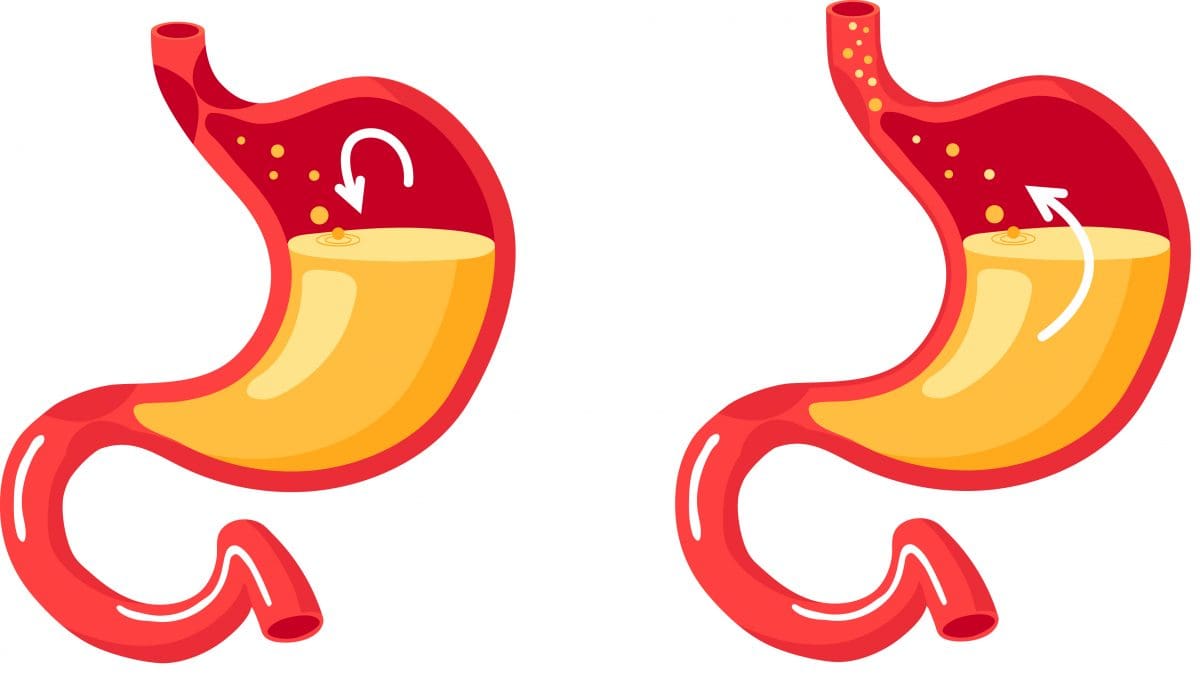Gastro-oesophageal reflux (GOR) means the backflow (reflux) of acidic stomach contents into the oesophagus (food pipe), which irritates the oesophagus, causing symptoms such as heartburn. Reflux is common – about 15 to 20 per cent of Australian adults have heartburn at least once a week and 5 per cent at least daily.

Gastro-oesophageal reflux happens when there is a backflow of acidic stomach contents into the oesophagus (food pipe)
The term ‘gastro-oesophageal reflux disease’ (GORD) is used when you have frequent or severe reflux symptoms – symptoms that happen twice or more each week or symptoms that are bad enough that they significantly impact your life. If you have complications of reflux (see below), you are also considered to have GORD.
GORD symptoms
The hallmark symptom of reflux is heartburn, a burning sensation in the stomach or lower chest rising up towards the throat. Heartburn often occurs after eating, or may be brought on by lying down or bending forward. Sometimes there is also regurgitation of food and stomach acid back up into the mouth. Gastro-oesophageal reflux can also be a cause of a chronic (ongoing) cough.
Less common reflux symptoms may also include nausea, excessive belching or chest pain. As it can be difficult to distinguish chest pain due to reflux from pain due to angina or heart attack, it is very important to seek medical attention if you have any chest pain so that it is correctly diagnosed.
Complications of reflux
Complications of gastro-oesophageal reflux disease can include:
- ulcers (sores) in the oesophagus that can cause bleeding (which can result in vomiting blood or iron-deficiency anaemia) or pain when swallowing;
- stricture (a narrowing of the oesophagus that can cause difficulty swallowing); and
- Barrett’s oesophagus (where there is a slightly increased risk of oesophageal cancer due to a change in the type of cells lining the oesophagus).
Oesophageal reflux diagnosis
To make a diagnosis, your doctor will ask about your reflux symptoms and perform a physical examination. Often a diagnosis of gastro-oesophageal reflux disease can be made based on symptoms and examination findings alone, without the need for any investigations.
In some people, self-help measures and a trial of medication are recommended. If symptoms improve with these, it helps to confirm the diagnosis. If symptoms don’t get better, tests may be recommended.
Some people will need investigations early on, usually an endoscopy. This procedure involves passing a flexible lighted tube down the oesophagus to view the oesophagus and stomach. It is carried out under sedation.
Other tests may include 24-hour oesophageal pH monitoring. This involves inserting a probe or passing a thin wire down the oesophagus to record the pH or acidity. This is the best test for diagnosing when a cough may be due to GOR.
GORD treatments
As well as relieving symptoms, treatment for gastro-oesophageal reflux disease (GORD) is aimed at preventing and treating complications (such as ulceration and scarring of the oesophagus).
There are some simple measures you can take to help relieve reflux symptoms. Anything that makes your symptoms worse, such as alcohol, smoking, coffee, spicy or fatty foods, or eating large meals, should be avoided.
If you are overweight, losing weight can help. Some people also find raising the head of the bed helpful.
As some medicines such as aspirin or non-steroidal anti-inflammatory drugs may make symptoms worse, you should discuss any medicines you are taking with your doctor.
For occasional, mild symptoms, antacids or other over-the-counter medicines may help. For more severe or regular symptoms, stronger medicines can be prescribed. These treatments are more effective in both relieving the symptoms and healing inflammation of the oesophagus.
If the response to medication is not satisfactory, surgery may be considered.





